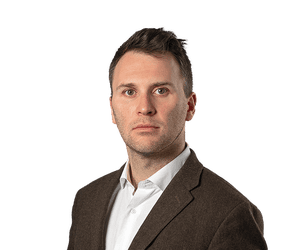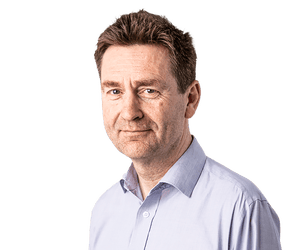Opening summary
It has gone 10am in Kyiv and 11am in Moscow. This is our latest Guardian blog on the war in Ukraine.
Russian President Vladimir Putin has called the capture of Avdiivka “an important victory” after Ukraine’s military chief said on Saturday that his troops withdrew from the devastated town in the east of the country after months of intense combat.
Although the Russian defence ministry said that Ukrainian units were still entrenched at the town’s coke plant, the advance on Avdiivka was Moscow’s biggest advance since it took the city of Bakhmut last May.
It is also the clearest sign yet of how the tide of the war has turned in Moscow’s favour after a Ukrainian counteroffensive failed to break through Russian lines last year.
“The head of state congratulated Russian soldiers on this success, an important victory,” the Kremlin said in a statement on its website.
US President Joe Biden meanwhile said he had told his Ukrainian counterpart Volodymyr Zelenskiy he was “confident” the US Congress would renew war aid, but added that without American help Kyiv could lose further territory to Russian advances.
Failure by US lawmakers to approve new funding for military aid to Kyiv would be “absurd” and “unethical,” Biden told reporters after attending church in Delaware, adding: “I’m going to fight to get them the ammunition they need.”
In other key developments:
-
Volodymyr Zelenskiy issued a desperate plea for fresh arms on Saturday. He told the Munich Security Conference that the slowing of weapons supplies was having a direct impact on the frontline and was forcing Ukraine to cede territory.
-
Zelenskiy also told world leaders not to ask when the Ukraine war will end but instead “why is Putin still able to continue it” as he underlined the threat Russia poses beyond his own country and called for more support.
-
A number of Ukrainian troops were captured by Russia during their withdrawal from the town of Avdiivka, Oleksandr Tarnavskiy, the Ukrainian commander responsible for forces in Ukraine’s south-east, has said.
-
The Russian defence ministry said on Sunday that Ukrainian forces had left Avdiivka and were entrenched at the nearby Avdiivka coke and chemical plant in Ukraine’s Donetsk region. “Measures are being taken to completely clear the city of militants and to block Ukrainian units that have left the city and are entrenched at the Avdiivka Coke and Chemical Plant,” spokesperson Igor Konashenkov said in a video published on the ministry’s Telegram channel.
-
Russian forces shelled and fired missiles at a series of cities in eastern Ukraine on Saturday, killing at least three people and leaving others under the rubble of shattered buildings, Ukrainian officials said. Two cities close to the frontline in eastern Ukraine’s Donetsk region – Kramatorsk and Slovyansk – came under fire. And farther north in the town of Kupiansk one person was killed when a two-storey house was struck by Russian shells, the governor of Kharkiv region said.
-
Ukrainian forces shot down three Russian warplanes over eastern Ukraine on Saturday, the country’s air force chief has said. This claim has not been independently verified.
-
Kamala Harris on Saturday criticised Donald Trump’s cajoling of Russia to attack Nato allies of the US who don’t pay their dues, saying the American people would never accept a president who bowed to a dictator. “The idea that the former president of the US would say that he – quote – encourages a brutal dictator to invade our allies, and that the United States of America would simply stand by and watch,” Harris said. “No previous US president, regardless of their party, has bowed down to a Russian dictator before.”
-
Ukrainian foreign minister Dmytro Kuleba said on Saturday he had discussed the prospects for peace with his Chinese counterpart, part of a long-running bid to bolster relations with Beijing. Kuleba said he had discussed with China’s top diplomat Wang Yi about Ukraine’s plans to hold a global peace summit, which Switzerland has agreed to help stage.
-
Russian opposition leader Alexei Navalny’s mother and his lawyer were told on Saturday that he had been struck down by “sudden death syndrome”, his team has said. Another lawyer of Navalny’s, however, was told by the penal colony’s investigative committee that the cause of death had not yet been established, Navalny’s spokesperson said.
-
G7 foreign ministers have demanded that Russia fully clarify the circumstances surrounding Navalny’s death. The foreign ministers of Britain, Canada, France, Germany, Italy, Japan and the US met in Munich on Saturday.
Key events
Republican senator says Putin not existential threat to Europe
JD Vance, the Republican senator from Ohio, said he believes Donald Trump doesn’t want to abandon Europe, but “is actually issuing a wake up call to say that Europe has to take a bigger role in its own security.”
Speaking at the third day of the Munich Security Conference, he added: “I do not think that Vladimir Putin is an existential threat to Europe, and to the extent that he is, again, that suggests that Europe has to take a more aggressive role in its own security.”
The limiting factor for US support to Ukraine, Vance argued, is “not money, it’s munitions.”
We don’t make enough munitions to support a war in eastern Europe, a war in the Middle East and potentially contingency in East Asia. So the United States is fundamentally limited.
‘Russia will continue to be a threat for Europe’, says UK shadow foreign secretary as he calls for UK-EU security pact

Lili Bayer
David Lammy, the UK shadow foreign secretary, said on stage at the Munich Security Conference that he wants a new security pact between the EU and the UK.
He said:
Of course I’m hoping that there is a general election this year and I have the privilege of becoming the UK foreign secretary, because it’s absolutely fundamental that the United Kingdom and Europe have the closest of relationships and the Brexit era is over, the situation is settled.
And what my party is proposing is a new EU-UK security pact. And it’s a pact that is effectively built on the fact that we obviously have war here in Europe.
But the truth is, and it’s important that we summon up to the room the courage of Alexei Navalny – what it reminds is that not withstanding that war, Russia will continue to be a threat for Europe for months, years, perhaps a generation more.
And that means that the defence capability of the UK, alongside our partners in France particularly representing about 50% of Europe’s defence capability, but also the intelligence capability of the Five Eyes system in partnership with the United States, Australia, New Zealand, Canada, is absolutely essential, and is why we need now a new security pact.
Now, that security pact is not to rival Nato, it is to run in parallel with Nato.
Here are some key points related to Russia–Ukraine from the second day of the Munich Security Conference on Saturday. The annual event brings together policymakers from across the globe for discussions on security. The day focused heavily on Russia’s war in Ukraine and the war in the Middle East.
-
The chief topic of conversation among the western defence establishment inside the gilded Hotel Bayerischer Hof was whether Ukraine’s problems are fixable – the answer is mainly yes – but only if the west has the political will to act.
-
Speaking at the conference, the German chancellor, Olaf Scholz, said Europeans need to do much more on security.
-
Volodymyr Zelenskiy, the Ukrainian president, told the conference participants that “2024 must become a time for a full restoration of a rules-based world order.”
-
The Ukrainian leader said that if Donald Trump visits Ukraine he would be ready to go with him to the frontline.
-
Zelenskiy also told world leaders not to fear Vladimir Putin’s defeat.
-
The European Commission president, Ursula von der Leyen, said the EU “has to step up its defence industrial base.”
-
David Cameron, the British foreign secretary, signalled that there would be “consequences” in the wake of the death of Alexei Navalny.
-
Germany’s Scholz said he was really depressed to hear of Navalny’s death.
-
Antony Blinken, the US secretary of state, warned against “dehumanisation.”
-
Wang Yi, China’s foreign minister, said in Munich that Beijing wants to be a force for stability and that China and Europe should avoid “ideological distractions.”
-
In a speech today in Hungary, the country’s prime minister, Viktor Orbán, said it is on course to ratify Sweden’s accession at the beginning of its parliament’s spring session, which begins on 26 February.
Ukrainian foreign minister Dmytro Kuleba said on Saturday he had discussed the prospects for peace in Kyiv’s nearly two-year-old war against Russia with his Chinese counterpart, part of a long-running bid to bolster relations with Beijing.
“I met with my Chinese counterpart Wang Yi to discuss bilateral relations, trade, and the need to restore a just and lasting peace in Ukraine,” Kuleba wrote on X of their talks at the Munich Security Conference.
Kuleba said he had discussed Ukraine’s plans to hold a global peace summit, which Switzerland has agreed to help stage. The two men, he said, “agreed on the need to maintain Ukraine-China contacts at all levels and continue our dialogue”.
I met with my Chinese counterpart Wang Yi to discuss bilateral relations, trade, and the need to restore a just and lasting peace in Ukraine.
I informed Foreign Minister Wang Yi about Ukraine’s vision for the upcoming Global Peace Summit in Switzerland.
We agreed on the need… pic.twitter.com/O6ZZOgjUVK
— Dmytro Kuleba (@DmytroKuleba) February 17, 2024
China has attended at least one of the preparatory meetings that have taken place in anticipation of such a summit.
Reuters reports that the Chinese foreign ministry has yet to release details on Wang’s talks with Kuleba. But, in his public remarks to the conference, Wang said China had persisted in promoting peace talks and in playing a positive role in restoring peace, according to a statement from the ministry released on Sunday.
Ukraine has sought to enhance ties with Beijing and bring China onside for Kyiv’s 10-point peace plan which focuses on a withdrawal of Russian troops from occupied territory, the restoration of 1991 post-Soviet borders and a framework to bring Moscow to account for its actions.
China, which has been pursing a “strategic partnership” with Russia, proposed a peace plan of its own last year calling for a ceasefire, negotiations and an end to sanctions against Russia. But the plan made little headway.
“China is not the creator of the Ukraine crisis, nor is it a party, but we have not merely watched the ‘fire’ on the other side, nor have we taken advantage of the opportunity to benefit [from the situation],” Wang said at the conference, according to the ministry’s statement.
Ukraine negotiations should restart as soon as possible to reduce losses on both sides, Wang told the conference. “As long as there is still a glimmer of hope for peace, we will not give up,” he said.

Andrew Roth
Also, the Guardian’s Moscow correspondent Andrew Roth has written about how the Kremlin are playing for time after Alexei Navalny’s death. You can read the piece here:
In Russia, it is not enough to kill an opposition leader. His ageing mother must travel to the Arctic Circle to search a prison colony and a morgue for his body. Russians with the temerity to lay carnations in his memory must be detained.
Even a preliminary cause of death, “sudden death syndrome”, was misleading, as though his death behind bars was not years in the making.
All this happened the day after Alexei Navalny died, as the bureaucratic machinery of the vast Russian state swung into gear, brushing over the Kremlin critic’s death with a veneer of official disdain and petty cruelty.
“It’s obvious that they are lying and doing everything they can to avoid handing over the body,” said Kira Yarmysh, Navalny’s press secretary, as 69-year-old Lyudmila, his mother, and a lawyer battled to retrieve his body in the city of Salekhard.

Jon Ungoed-Thomas
My colleague, the Observer’s Jon Ungoed-Thomas has written about a new scheme which means Ukrainians can extend their UK visas by 18 months. You can read the piece here:
Ukrainians who sought sanctuary in the UK after the Russian invasion will be permitted to extend their visas for an extra 18 months, the Home Office has announced.
More than 200,000 Ukrainians visa holders have arrived in the UK since March 2022, with the first visas to expire in March next year. The Home Office said that the new scheme would provide “certainty and assurance” for Ukrainians in the UK.
This weekend, the government appealed for more British families to come forward to sponsor Ukrainians. But the Local Government Association (LGA) sounded a note of caution, urging the government to review the financial support for Ukrainians facing the risk of homelessness.
Ukraine’s forces destroyed 12 Russia-launched attack drones overnight as well as one Kh-59 cruise missile and one SU-34 fighter-bomber, Ukraine’s air force commander said on Sunday, reports Reuters.
“I want to thank air force units for their successful combat work!” Mykola Oleshchuk wrote on the Telegram messaging app. “Have a nice day everyone!”
Reuters could not independently verify the report.
Opening summary
It has gone 10am in Kyiv and 11am in Moscow. This is our latest Guardian blog on the war in Ukraine.
Russian President Vladimir Putin has called the capture of Avdiivka “an important victory” after Ukraine’s military chief said on Saturday that his troops withdrew from the devastated town in the east of the country after months of intense combat.
Although the Russian defence ministry said that Ukrainian units were still entrenched at the town’s coke plant, the advance on Avdiivka was Moscow’s biggest advance since it took the city of Bakhmut last May.
It is also the clearest sign yet of how the tide of the war has turned in Moscow’s favour after a Ukrainian counteroffensive failed to break through Russian lines last year.
“The head of state congratulated Russian soldiers on this success, an important victory,” the Kremlin said in a statement on its website.
US President Joe Biden meanwhile said he had told his Ukrainian counterpart Volodymyr Zelenskiy he was “confident” the US Congress would renew war aid, but added that without American help Kyiv could lose further territory to Russian advances.
Failure by US lawmakers to approve new funding for military aid to Kyiv would be “absurd” and “unethical,” Biden told reporters after attending church in Delaware, adding: “I’m going to fight to get them the ammunition they need.”
In other key developments:
-
Volodymyr Zelenskiy issued a desperate plea for fresh arms on Saturday. He told the Munich Security Conference that the slowing of weapons supplies was having a direct impact on the frontline and was forcing Ukraine to cede territory.
-
Zelenskiy also told world leaders not to ask when the Ukraine war will end but instead “why is Putin still able to continue it” as he underlined the threat Russia poses beyond his own country and called for more support.
-
A number of Ukrainian troops were captured by Russia during their withdrawal from the town of Avdiivka, Oleksandr Tarnavskiy, the Ukrainian commander responsible for forces in Ukraine’s south-east, has said.
-
The Russian defence ministry said on Sunday that Ukrainian forces had left Avdiivka and were entrenched at the nearby Avdiivka coke and chemical plant in Ukraine’s Donetsk region. “Measures are being taken to completely clear the city of militants and to block Ukrainian units that have left the city and are entrenched at the Avdiivka Coke and Chemical Plant,” spokesperson Igor Konashenkov said in a video published on the ministry’s Telegram channel.
-
Russian forces shelled and fired missiles at a series of cities in eastern Ukraine on Saturday, killing at least three people and leaving others under the rubble of shattered buildings, Ukrainian officials said. Two cities close to the frontline in eastern Ukraine’s Donetsk region – Kramatorsk and Slovyansk – came under fire. And farther north in the town of Kupiansk one person was killed when a two-storey house was struck by Russian shells, the governor of Kharkiv region said.
-
Ukrainian forces shot down three Russian warplanes over eastern Ukraine on Saturday, the country’s air force chief has said. This claim has not been independently verified.
-
Kamala Harris on Saturday criticised Donald Trump’s cajoling of Russia to attack Nato allies of the US who don’t pay their dues, saying the American people would never accept a president who bowed to a dictator. “The idea that the former president of the US would say that he – quote – encourages a brutal dictator to invade our allies, and that the United States of America would simply stand by and watch,” Harris said. “No previous US president, regardless of their party, has bowed down to a Russian dictator before.”
-
Ukrainian foreign minister Dmytro Kuleba said on Saturday he had discussed the prospects for peace with his Chinese counterpart, part of a long-running bid to bolster relations with Beijing. Kuleba said he had discussed with China’s top diplomat Wang Yi about Ukraine’s plans to hold a global peace summit, which Switzerland has agreed to help stage.
-
Russian opposition leader Alexei Navalny’s mother and his lawyer were told on Saturday that he had been struck down by “sudden death syndrome”, his team has said. Another lawyer of Navalny’s, however, was told by the penal colony’s investigative committee that the cause of death had not yet been established, Navalny’s spokesperson said.
-
G7 foreign ministers have demanded that Russia fully clarify the circumstances surrounding Navalny’s death. The foreign ministers of Britain, Canada, France, Germany, Italy, Japan and the US met in Munich on Saturday.